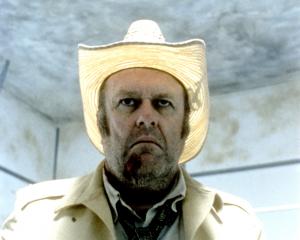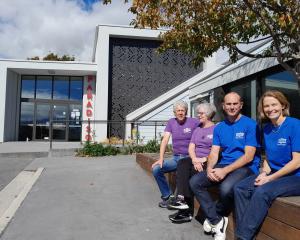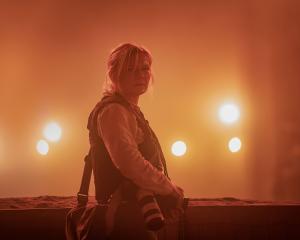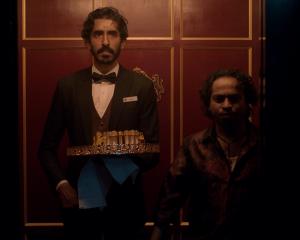Kiwi film-maker Florian Habicht's documentary about English band Pulp focuses on people both common and celebrated, writes Shane Gilchrist.
There is a scene towards the end of Kiwi film-maker Florian Habicht's music documentary, Pulp: a film about life, death and supermarkets, that might seem a little, well, routine in the context of a pop-rock existence, yet it says a lot.
Here is Pulp's key songwriter and frontman, Jarvis Cocker, changing a car tyre on a fairly ordinary Sheffield street, on a fairly ordinary day, an action symbolic of a man who, apparently, prefers to deal with the basics first; someone less fixated with the notion of ''product'' and more interested in making good art.
Among the various highlights of the 2014 New Zealand International Film Festival, Habicht's collaboration with Cocker documents a 2012 concert at Sheffield's Motorpoint Arena. Billed as the acclaimed English band's last, it features the line-up of Mark Webber, Steve Mackey, Nick Banks, Candida Doyle and Cocker.
Equally significantly, however, is the director's portrait of the people of Sheffield, the northern England steel city from which Pulp emanated.
As festival director Bill Gosden says: ''Habicht accosts resolutely down-to-earth Sheffielders with questions about love, life and the meaning of Jarvis. He draws equally arresting testimony from band members, visiting fans, Jarvis' mum and the man himself. Rousing concert footage is supplemented with unlikely performances from locals who've made the Pulp repertoire resoundingly their own.''
Formed in 1978, when Cocker was 15, Pulp released a handful of albums and singles in the 1980s to scant attention. However, buoyed by a range of singles, including Babies, Common People and Sorted for E's & Wizz, the band became one of the most popular British groups of the 1990s despite (or, perhaps, because of) numerous incarnations and changes in musical style.
On the phone from Wellington earlier this week, Habicht says most of the people who appear in Pulp: a film about life, death and supermarkets, are the result of a relaxed, go-with-the-flow film-making approach. The transparent benefits of ''meeting strangers on the street'' are readily apparent: Josephine, an older fan, comments on the depth of Cocker's lyricism; Melina, a young solo mother who travelled from Atlanta, Georgia, to see the concert, is almost in tears after the final concert.
A couple of other scenes suggest Pulp's music has an enduring quality: in one, Habicht had several older cafeteria diners sing Help the Aged; clearly staged, it nonetheless offers a celebratory reflection on Cocker's songwriting, as does another in which smiles slowly spread across the faces of two young children as they listen to one of the band's songs for the first time.
''It's quite amazing that the band can speak to so many different people,'' the director says.
''I think what was nice, for me, was that I could feel the music still resonates.''
Cocker's artisan ethic has long resonated with Habicht. Born in Berlin, the son of '60s photographer Frank Habicht moved to New Zealand with his family in the early 1980s, eventually studying at the Elam School of Fine Arts, Auckland, then Binger Filmlab in Amsterdam.
An inventive auteur whose films have combined a unique sense of humour and oddball narratives with often seductive and lush imagery, Habicht's 2003 no-budget feature Woodenhead, a surreal Grimm musical fairy tale, was followed by 2004 documentary Kaikohe Demolition and 2008 effort Rubbings from a Live Man, a documentary performed entirely by its subject, New Zealand actor, writer and director Warwick Broadhead.
In 2010 Habicht spent a year in New York, where he made feature romance Love Story, an organic process that involved him shooting the film's opening sequence then asking ordinary New Yorkers (and a psychic) for love advice and ideas on what should happen next in the story. These ideas were then acted out in dramatic scenes with actress Masha Yakovenko and the film's narrative was crowd-sourced or dictated by the city.
There is a connection between Habicht's previous project and his latest.
In 2012, with the final show of Pulp's reunion tour just two months away, Habicht invited Cocker to attend Love Story at the London Film Festival.
''I planted a seed about making a doco about the band and he had been wanting to do that as well. That's how it came about.
''I had no idea that reunion tour was happening. They did no media for that tour and it wasn't recorded in any way. But towards the end of the tour, Jarvis started thinking perhaps it should be captured in some way,'' Habicht explains.
''The whole project took less than 18 months which, in film terms, is quite a fast turnaround.
''We shot a couple of weeks before the gig and after the concert as well, the intention being to re-create a loose day and night in the life of Sheffield.''
The fact he is a fan of the band presented its own challenges, the film-maker says.
''It was definitely a buzz, but it also added a wee bit of pressure. When you make a film about something you really care about, you want to get it right.''
See it: As part of the 2014 New Zealand International Film Festival, Pulp: a film about life, death and supermarkets screens at the Regent Theatre, Dunedin, on Thursday, August 7, at 4.15pm and on Thursday, August 14, at 8.15pm.












